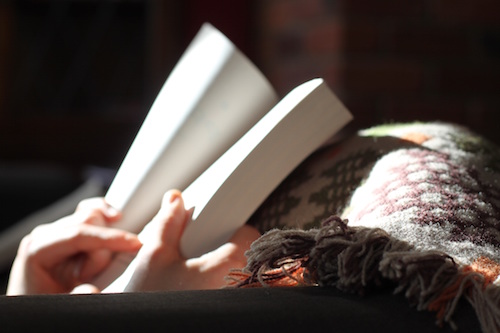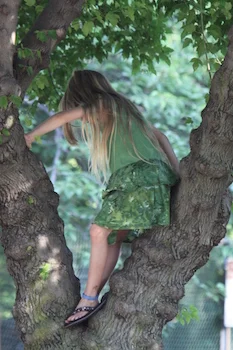Testimonies
Christians love to ask each other how they “got saved.” It’s never been an easy question for me to answer. If you ask, I’ll probably say that I am saved, but also that I am being saved all the time, that it’s a thing I’m working out with more than a little fear and trembling. I’ll say that my “testimony” involves a lot of stories, not just one. My personal history of faith is all bound up in my personal history as a writer and a reader. If you have time to listen, I’ll tell you some of the tales.
Photograph by Dave Hosford
1. My long, white-blond hair is pulled into a ponytail and my thighs are red with the pattern of mesquite bark. I am nailing an empty tin Band-Aid box to the trunk of my tree — that’s how I think of it, as my tree. Two sturdy branches form my seat and my backrest, and I can sit here and write stories, then store them inside the waterproof (I hope it will be waterproof—maybe I should put them in a Ziploc bag and then into the box) and hidden box.
This is not an original idea. Betsy Ray, heroine of a series of books by Maud Hart Lovelace, does the same with a cigar box. I’m not sure what a cigar box is, but I feel pretty confident that a Band-Aid box must be a close approximation. Betsy wants to be a writer. So do Jo March and Anne of Green Gables, and I can’t tell if they are my favorite characters because I want to be a writer too, or if I want to be a writer because they are my favorite characters.
I sit in my tree making up sci-fi stories about the distant lights of San Antonio and moralistic fairy tales about disobedient children. My faith is in the beauty of nature: if God made this, then God must be good. I believe in beauty and hospitality and being good, and faith sounds like the acoustic guitar in the school cafeteria where our church meets. Belief comes easy, with hand motions and memorization and the security of being loved.
2. Betsy Ray’s high school stories, set in the first decade of the twentieth century, did not prepare me for what it would be like to be a teenager in the last decade of the twentieth century, and I am lonely. I sit in class with Kerouac and Salinger, L’Engle and Rilke tucked inside my textbooks. At night I write fervent prayers in my journal. The class papers I write are not exposition or analysis so much as fictional stories about a girl named Sophia, but my teachers don’t seem to mind. My social life revolves around events at my megachurch youth group in Little Rock, where I’m one of the leaders, one of the on-fire girls, but I’m starting to find as much inspiration in Indigo Girls lyrics as I find in repetitive praise choruses. There’s a red Book of Common Prayer on my family’s bookshelves, and I start to read it. When Betsy Ray was in high school, after all, she left her parents’ Baptist church and became Episcopalian.
3. I’m still going to a non-denominational Bible church in college in Texas, but something rings false. Everyone there wants to climb a ladder of spiritual success, rungs defined by the college pastor, and I opt out. I drive to the half-price bookstore and browse the religion shelves, leaving with a battered copy of The Cloister Walk and a thick paperback of A Prayer for Owen Meany. With them, I find my spiritual language renewed. I can have FAITH (as Owen Meany would say) again.
I tend to the heartbreaks of early adulthood by losing myself in research, and I love it so much more than I love the boy who broke my heart. My love shows — I win runner-up in a poetry contest, first place for the honors research writing project, and a chance to present at an undergrad lit conference.
But first place in my affections — does it belong to my art or to God? The conflict Asher Lev experiences strikes me through the heart. Will devotion to the written word separate me from the people of the Word, from the Word Himself?
College is ending, and I know I cannot become Asher Lev or Nancy Drew or Jo March. I want adventure and I want to be good. Betsy Ray had sought out the Great World after college, and I decide to do the same. But I will do it for God, not to get story ideas, like she did. I go to Southeast Asia to teach English and win souls.
4. All my prayers are answered. Miracles happen, streams flow from rocks. Although I’m living in an Asian country where Christianity is forbidden, students come knocking on my door to ask about Jesus, and when I study the Gospels with them, I’m shocked to find that the Gospels make sense, even here on the other side of the world. I start writing a book about all the things that are wrong with American Christianity, sure that though I’m 22, I have something vital and wise to say about syncretism and consumerism. In my spare time I borrow books from an English library: David James Duncan, Carol Shields, Ann Patchett, Czeslow Milosz, Billy Collins, Barbara Kingsolver.
5. I am at Wheaton taking grad classes for the summer after my first year of teaching. Life is beautiful and I think I might stay in Southeast Asia for the next decade. Then I get the call. One year of grace and glory, miracles and renewed faith, and then I’m kicked out of the country. They suspect I’m CIA. They found out I gave Bibles to my students, whom they’ve brought in for interrogation over and over and over during the summer. I tailspin. At Wheaton I neglect my classwork. I read Girl Meets God. I take the train into Chicago and walk through the Art Institute. Finally, I decide to spend another year overseas—in Cambodia, an open country—teaching English at the Royal University. It’s beautiful, and sometimes I’m happy, but God is quiet. I don’t trust God anymore. I don’t read much anymore.
6. My daughter is only four, but when I tuck her into bed, we read a chapter from The Chronicles of Narnia. She’s mesmerized, and I remember the way that the rhythm of language can be beautiful even when you can’t understand all of the words. My faith has grown much quieter since I left Asia; I am no longer the good girl with the right answers. I no longer understand all of the words. The rhythm of language is part of the reason I’ve started attending an Episcopal church here in Indiana. I need the liturgy.
Marriage made me happy, but early motherhood makes me hazy. Music is always on: I love the Southern Gothic stories of Sam Beam, the intense wordplay of Joanna Newsom, the way Sufjan Stevens wrestles with God. I read things that are easy to read, mysteries by Agatha Christie and Louise Penny, young adult novels by Sara Zarr and Gary Schmidt, John Green and Rainbow Rowell. I read books about early childhood development, and I dip into Mary Oliver, and I try to believe that I do not have to be good.
7. The contemporary novelists who are influencing me most right now are those who wrestle with God—writers like Elizabeth Strout, Kyle Minor, and Jamie Quatro. Then there are the authors who, at pivotal moments in my life, made me believe faith could be more than clichés and textbook answers: Kathleen Norris, Lauren Winner, and Marilynne Robinson. These are the writers who have made the path on which I want to walk.
How did I get saved? By the grace of God, surely, once and for always. But also, every day: following this path keeps saving my life, keeps me attentive to the mystery of the Word with us. I read and I write because sometimes I find God in the pages. And, like the distant lights of San Antonio, the God I see enchants and confounds, catches me up into something beyond myself. I forget to try to be good; I know that I am part of this story, and I am loved.

Photograph by Alice Hampson



















